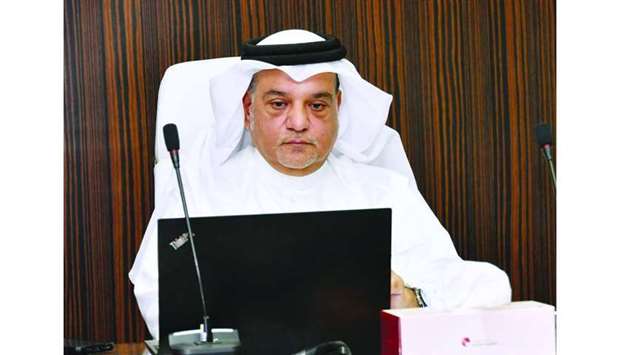The State of Qatar is putting “great importance” on food security and is “striving hard” to raise the country’s level of self-sufficiency, according to Qatar Chamber board member Mohamed bin Ahmed al-Obaidli.
Al-Obaidli, who is also the chamber’s Food Security and Environment Committee chairperson, also stressed that the Qatar National Vision 2030 aims to achieve self-sufficiency, reduce imports, develop agriculture and food processing, establish logistic warehouses, and open the scope for investment in this “vital” sector.
Speaking at the ‘Arab-Hellenic Food Forum’, which was organised by the Arab-Hellenic Chamber of Commerce and Development (AHCCD) via video conferencing, al-Obaidli said Qatar “highly welcomes” foreign investors who are willing to invest in food security projects and forge partnerships with Qatari businessmen in various sectors.
These sectors include food processing for local products, such as vegetables, dates, dairy products, table egg, poultry, and fish, said al-Obaidli, who stressed that this would help provide surpluses in production and achieving self-sufficiency throughout the year, as well as reducing food wastage.
Al-Obaidli emphasised that Qatar has built state-of-the-art infrastructure that capable of attracting mega projects in the food security sector, food processing, and the re-export fields.
Addressing a session titled ‘Irrigation Technology, Sustainable Agriculture & Food Processing Industries’, al-Obaidli said the volume of investments in Qatar’s foodstuff manufacturing industry stood at QR5bn in 2020, registering a 69% growth from 2017. The number of food processing facilities increased by 55% last year. He also said the beverage sector grew by 22% last year compared to 2017, while the number of facilities operating in this sector increased by 40%.
The forum gathered the participation of representatives from the Arab League, Union of Arab Chambers, Qatar Chamber, and other Greek officials. It was also attended by a number of representatives from Arab chambers of commerce and private sector institutions. The conference’s objective was to exchange expertise in the food sector and to enhance co-operation between Greece and Arab countries.
The event opened with remarks by Rashad Mabger, secretary general of AHCCD, and an introduction by AHCCD vice president Suheil Sabbagh. The agenda consisted of six sessions on topics related to agriculture, food industries, fisheries, water resources, and sustainable agriculture. It also discussed climate change, food production, and the halal industry.
Al-Obaidli, who is also the chamber’s Food Security and Environment Committee chairperson, also stressed that the Qatar National Vision 2030 aims to achieve self-sufficiency, reduce imports, develop agriculture and food processing, establish logistic warehouses, and open the scope for investment in this “vital” sector.
Speaking at the ‘Arab-Hellenic Food Forum’, which was organised by the Arab-Hellenic Chamber of Commerce and Development (AHCCD) via video conferencing, al-Obaidli said Qatar “highly welcomes” foreign investors who are willing to invest in food security projects and forge partnerships with Qatari businessmen in various sectors.
These sectors include food processing for local products, such as vegetables, dates, dairy products, table egg, poultry, and fish, said al-Obaidli, who stressed that this would help provide surpluses in production and achieving self-sufficiency throughout the year, as well as reducing food wastage.
Al-Obaidli emphasised that Qatar has built state-of-the-art infrastructure that capable of attracting mega projects in the food security sector, food processing, and the re-export fields.
Addressing a session titled ‘Irrigation Technology, Sustainable Agriculture & Food Processing Industries’, al-Obaidli said the volume of investments in Qatar’s foodstuff manufacturing industry stood at QR5bn in 2020, registering a 69% growth from 2017. The number of food processing facilities increased by 55% last year. He also said the beverage sector grew by 22% last year compared to 2017, while the number of facilities operating in this sector increased by 40%.
The forum gathered the participation of representatives from the Arab League, Union of Arab Chambers, Qatar Chamber, and other Greek officials. It was also attended by a number of representatives from Arab chambers of commerce and private sector institutions. The conference’s objective was to exchange expertise in the food sector and to enhance co-operation between Greece and Arab countries.
The event opened with remarks by Rashad Mabger, secretary general of AHCCD, and an introduction by AHCCD vice president Suheil Sabbagh. The agenda consisted of six sessions on topics related to agriculture, food industries, fisheries, water resources, and sustainable agriculture. It also discussed climate change, food production, and the halal industry.

